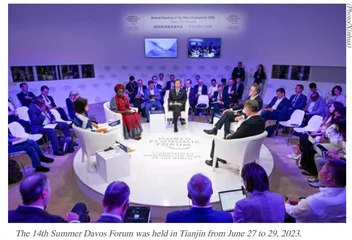Reconstruction of the Global Economic Governance System and China’s Role under the Profound Changes
作者: Chen Weiguang

The world today is undergoing profound changes unseen in a century. In particular, under the impact of the COVID-19 pandemic and the Ukraine crisis, the global political and economic landscape has undergone unprecedentedly profound changes, and the current global economic governance system is facing multiple crises, such as the lack of legitimacy, effectiveness, and common values. Hence, promoting the reform of the global governance system is becoming the prevailing trend.
The driving mechanism of the evolution of the global economic governance system
The global economic governance system mainly refers to the organizational framework and institutional rules and arrangements for conducting economic cooperation and maintaining global economic order established by the international community in interactions. System is an important feature of economic globalization since the end of World War II. The global economic governance system, with the Bretton Woods system as the institutional framework, has set the tone for the development of economic globalization. However, under the impact of external factors, the inherent inertia of the institutional system has made it impossible for the original institutional arrangements to reasonably reflect the new changes in the actors’ perceptions, power and interest structures. Such contradiction has driven the continuous evolution of the global economic governance system, the course of which can be roughly divided into the following three stages.
First, the period of rise and fall of the Bretton Woods system. The Bretton Woods system, established under the leadership of the United States after World War II, was once the most stable monetary system and the best period for real economic indicators. However, with the outbreak of the War in Korean Peninsula and the Vietnam War, coupled with the impact of the oil crisis, the Bretton Woods system was eventually dismantled by the US when it unilaterally declared the closure of the “Gold Window”.
Second, the period of rise and fall of the neo-liberal system. Neo-liberalism and the Washington Consensus formed under the guidance of this concept were the important guidelines for the formulation of domestic and foreign policies of the Western countries led by the US and the United Kingdom in the 1980s, and also an important theoretical model for dominating the post-Cold War super-globalization. After the end of the Cold War, the global economic governance system moved from the polarization to unification. The Group of 20 was identified as the main forum for international economic cooperation, enabling the formation of a governance system of truly global significance.
Third, the period of sudden changes in the global economic governance system. Entering the second decade of the 21st century, the world economic recovery has been sluggish, global trade has continued to slump, global problems such as energy crises, economic imbalances, public health crises and even geopolitical conflicts have occurred frequently, and the process of economic globalization has been seriously impeded by the rise of anti-globalization. Especially since 2018, the major shifts of China-US relations, the COVID-19 pandemic, the Ukraine crisis and other factors have been driving the accelerated evolution of the once-in-a-century changes. The global economic governance pattern has seen profound adjustments, and the global economic governance system is facing reconstruction.
At present, the drivers leading to the rapid evolution of the global economic governance system mainly come from three aspects. The first is external shocks. External shocks are often the trigger for sudden changes in the global economic governance system. Sudden major events such as wars, economic crises, scientific and technological revolutions, natural disasters and public health events often tend to trigger rapid changes in the international system, whose impact can be either positive or negative.
The second is structural changes. The international system is the solidification of actors’ concepts, the result of power and the reflection of interests. Hence, structural changes in the concepts, power and interests of state actors are the endogenous driving force behind the evolution of the global economic governance system. First, in recent years, the Cold War mentality has returned, the US perception and orientation towards China has seriously deviated, regarding China as the most important competitor and the most serious geopolitical challenge, and values-oriented diplomacy has become an important means for the US to step up competition and containment towards China. Second, in the evolution of the international power structure, when there is a dominant power, the power monopolist will dominate the design and implementation of the system; when there is no dominant power, the result of the power balance between countries will determine the direction of system changes. The continuous development of multipolarity in today’s world has led to accelerated changes in the existing international system. Finally, benefit considerations are the driving force for state actors to push for changes in the global governance system. The distributional effects of the international system are non-neutral for different state actors at the same time and vary for the same state actor at different times. Those with vested interests will strengthen and legitimize the system, while those with compromised interests will question or even challenge the existing institutional system.